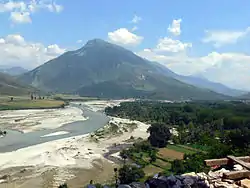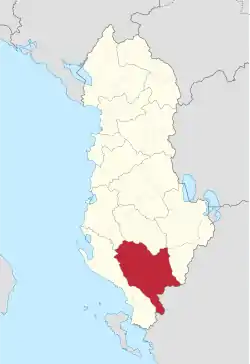Gjirokastër County
Gjirokastër County (Albanian: Qarku i Gjirokastrës) is one of the 12 counties of Albania. The population at the 2011 census was 72,176, in an area of 2884 km².[2] Its capital is the city Gjirokastër.
Gjirokastër County
Qarku Gjirokastër | |
|---|---|
 Vjosë River | |
 Emblem | |
 | |
| Coordinates: 40°10′N 20°10′E | |
| Country | |
| Seat | Gjirokastër |
| Subdivisions | 7 municipalities, 268 towns and villages |
| Government | |
| • Council chairman | Armand Hilaj |
| Area | |
| • Total | 2,884 km2 (1,114 sq mi) |
| Population (2020[1]) | |
| • Total | 59,381 |
| • Density | 21/km2 (53/sq mi) |
| Time zone | UTC+1 (CET) |
| • Summer (DST) | UTC+2 (CEST) |
| NUTS Code | AL033 |
Administrative divisions
Until 2000, Gjirokastër County was subdivided into three districts: Gjirokastër, Përmet, and Tepelenë. Since the 2015 local government reform, the county consists of the following 7 municipalities: Dropull, Gjirokastër, Këlcyrë, Libohovë, Memaliaj, Përmet and Tepelenë.[3] Before 2015, it consisted of the following 32 municipalities:
- Antigonë
- Ballaban
- Buz
- Çarshovë
- Cepo
- Dishnicë
- Dropull i Poshtëm
- Dropull i Sipërm
- Frashër
- Fshat Memaliaj
- Gjirokastër
- Këlcyrë
- Kordhocë
- Krahës
- Kurvelesh
- Lazarat
- Libohovë
- Lopës
- Luftinjë
- Lunxhëri
- Memaliaj
- Odrie
- Përmet
- Petran
- Picar
- Pogon
- Qendër Libohovë
- Qendër Piskovë
- Qendër Tepelenë
- Qesarat
- Sukë
- Tepelenë
- Zagori
The municipalities consist of about 270 towns and villages in total. See Villages of Gjirokastër County for a structured list.
Demographics
Its population includes a substantial Greek minority which in several places becomes a majority.[4][5][6] According to the last national census from 2011 this county has 72,176 inhabitants. Ethnic groups in the county include Albanians, Greeks, Aromanians, Romani, & Balkan Egyptians[2]
According to the 2011 census Islam is by far the largest religion in the county, forming 38.54% of the total population (27,815 people). There are also some Bektashi Muslims with 8.48% (6,118 people), 7.15% percent consisting of believers without a denomination (22,186 people) and Christians forming 19.65% of the county's population (Orthodox (17.43%) (15,295 people), Evangelists (0.08% (59 people) (and Roman Catholics) (2.07%) (1,493 people).
Demographics history of Permet district
- 1921: A 1921 document has the population divided by 12,780 Orthodox and 12,173 Muslims, a total of 25,043.[7] Greek was spoken as a first language in few parts of the district.[7] The northern part of the kaza was inhabited by Muslims.[8]
- 1918–19: According to Greece Before the Conference (1919), the kaza (Ottoman district) of Premeti had 15,138 Muslims, 10,823 Greeks, 888 Others; a total of 26,849.[9]
- 1913: According to Mary Edith Durham, writing on 3 September 1913, the district of "Premeti" was "purely Albanian".[10]
- 1904: According to German state archives, in 1904, the district of Premeti had 8,000 inhabitants, all Albanians, divided by 5,000 Muslims and 3,000 Christians.[11]
Notable people
References
- "Popullsia e Shqipërisë". instat.gov.al (in Albanian and English). 12 June 2020. Archived from the original on 12 June 2020.
- "2011 census results" (PDF). Archived from the original (PDF) on 2016-03-04. Retrieved 2015-05-25.
- "Law nr. 115/2014" (PDF). Archived from the original (PDF) on 2015-09-24. Retrieved 2015-06-04.
- http://mondediplo.com/maps/albanianmdv1999 The Albanians, a scattered people by Philippe Rekacewicz, Le Monde diplomatique, January 1999
- "Country Studies US: Greeks and Other Minorities". Retrieved September 6, 2006.
- "Second Report Submitted by Albania Pursuant to Article 25, Paragraph 1 of the Framework Convention for the Protection of National Minorities" (PDF). Archived from the original (PDF) on March 19, 2009.
- Basil Kondis (1994). The Greek Minority in Albania: A Documentary Record (1921-1993). Institute For Balkan Studies. pp. 55–56. ISBN 978-960-7387-02-8.
- Kondis 1994, p. 42
- Greece Before the Conference. Methuen & Company. 1919. p. 80.
- M. Edith Durham; Harry Hodgkinson; Bejtullah Destani (22 July 2005). Albania and the Albanians: Selected Articles and Letters, 1903-1944. I.B.Tauris. pp. 33–. ISBN 978-1-85043-939-4.
- Das Staatsarchiv. 68–70. Akademische Verlagsgesellschaft m.b.h. 1904. p. 32.
Further reading
- Kallivretakis, Leonidas (1995). "Η ελληνική κοινότητα της Αλβανίας υπό το πρίσμα της ιστορικής γεωγραφίας και δημογραφίας [The Greek Community of Albania in terms of historical geography and demography]". In Veremis, Thanos (ed.). Ο Ελληνισμός της Αλβανίας [The Greeks of Albania]. University of Athens. pp. 25–58. ISBN 9600800545.
